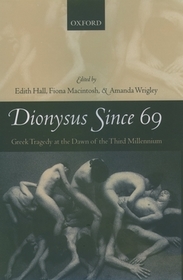
Dionysus Since 69
Greek Tragedy at the Dawn of the Third Millennium
- Publisher's listprice GBP 207.50
-
102 401 Ft (97 525 Ft + 5% VAT)
The price is estimated because at the time of ordering we do not know what conversion rates will apply to HUF / product currency when the book arrives. In case HUF is weaker, the price increases slightly, in case HUF is stronger, the price goes lower slightly.
- Discount 10% (cc. 10 240 Ft off)
- Discounted price 92 161 Ft (87 773 Ft + 5% VAT)
Subcribe now and take benefit of a favourable price.
Subscribe
102 401 Ft

Availability
printed on demand
Why don't you give exact delivery time?
Delivery time is estimated on our previous experiences. We give estimations only, because we order from outside Hungary, and the delivery time mainly depends on how quickly the publisher supplies the book. Faster or slower deliveries both happen, but we do our best to supply as quickly as possible.
Product details:
- Publisher OUP Oxford
- Date of Publication 8 January 2004
- ISBN 9780199259144
- Binding Hardback
- No. of pages500 pages
- Size 223x145x32 mm
- Weight 835 g
- Language English
- Illustrations numerous halftones 0
Categories
Short description:
Greek tragedy is currently being performed more frequently than at any time since classical antiquity. This lavishly illustrated book is the first attempt fully to document and explain its revival. It assembles fourteen essays by specialists from classics, theatre studies, and the professional theatre, who relate the recent production history of Greek tragedy to social and academic trends.
MoreLong description:
Greek tragedy is currently being performed more frequently than at any time since classical antiquity. This book is the first to address the fundamental question, why has there been so much Greek tragedy in the theatres, opera houses and cinemas of the last three decades? A detailed chronological appendix of production information and lavish illustrations supplement the fourteen essays by an interdisciplinary team of specialists from the worlds of classics, theatre studies, and the professional theatre. They relate the recent appeal of Greek tragedy to social trends, political developments, aesthetic and performative developments, and the intellectual currents of the last three decades, especially multiculturalism, post-colonialism, feminism, post-structuralism, revisions of psychoanalytical models, and secularization.
Hall's 46-page introduction to the volume is one of the best pieces that have been written so far in the area of Reception Studies of classical texts, and ought to be mandatory reading for anyone interested in this area.
Table of Contents:
Introduction: Why Greek tragedy since the late 1960s?
1. Dionysus and the Sex War
Dionysus in '69
Bad women: gender politics in late twentieth-century performance and revision of Greek tragedy
Heracles as Dr Strangelove and GI Joe: male heroism deconstructed
2. Dionysus in Politics
Sophocles' Philoctetes, Seamus Heaney's, and some other recent half-rhymes
Aeschylus, race, class, and war in the 1990s
Greek tragedy in cinema: theatre, politics, history
Greek drama and anti-colonialism: decolonising Classics
3. Dionysus and the Aesthetics of Performance
The use of masks in modern performances of Greek tragedy
Greek notes in Samuel Beckett's theatre art
Greek Tragedy in late twentieth-century opera
4. Dionysus and the Life of the Mind
Oedipus in the East End: from Freus to Berkoff
Thinking about the origins of theatre in the 1970s
The voices we hear
Details of productions discussed




